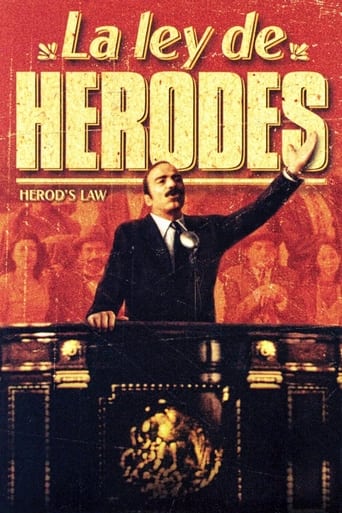fiodorovich
If you want to understand La Ley De Herodes you need to be aware of what the PRI was really on Mexico. First of all it began as a Party that unified the state after our famous and violent revolution the PRI unified Mexico, it started as a good cause but with time it degraded and became what we could see in the movie. At that time, I mean 1940 the Miguel Aleman period there wasn't a Party or force that opposite the PRI, because they control everyone, but they control everyone because they on their side the workers and peasants, because they supported them on their works allowing them to have their syndicates and supporting their demands. Now thats why I think we cant just go like "yes I think that La Ley De Herodes reflects perfectly how the PRI was" I repeat we have to understand the historical contest so that we can make an objective opinion.
ladridibicicletta11
This is truly a great amazing movie, unknown by many because since Hollywood is an industry, check this out, art is now an industry, well, however, this movie is unknown by so many because it isn't in English and is not a Hollywood production, that's why. but can't you peoplesee the U.S. politics? the politic of war? i'm not defending politics in Mexico, which are terribly corrupt, but, you are talking about it as if Mexico was the only corrupt country in the world. Mr Bush is even worse than any politician depicted in this movie, in fact, he is the worst politician in the world. Truly, we have a very big corruption problem in Mexico, and this movie is so right about it. It should be listed in IMDb's top 250. it isn't there simply because it's not a commercial one.
Au-Cinema
With the sardonic tone of a political cartoon, Luis Estrada skillfullypresents government the way you know it works: standing onscandal, bribes, brutality and general treachery. Herod's Law is setat ground zero of political corruption, Mexico's revolutionary party,PRI. Herod's Law is an excellent balance of farce and bite. LuisEstrada frames excellent performances from his cast. DamianAlcazar provides a superb performance as the hapless, dutifulmember of the PRI thrown into a leadership position and is slowlyinfected with power and all the neurosis and paranoia symptomatic of a whetted appetite. The story is excellent, thenarrative arc is well-crafted, and performances outstanding. It istrue, however, that the film fails to introduce anything novel.However these are all considered trademarks in the politicalcartoon business. The film deals solely with establishedarchetypes, it doesn't introduce new concepts or engage with anyunfamiliar issue. It does little beyond reinforcing stereotypes andconfirming preconceived notions. However, the art of the politicalcartoon is the playfulness with which the cartoonist employs thesearch characters. Herod's strength is the playfully exaggeratedtreatment of the subject. The posture is almost vaudevillesque inits rhythm. The tone perfectly describes the whirlwind madnessthat envelopes a man as he descends from idealist to practicingpolitician.For more foreign film news, reviews and interviews check outwww.au-cinema.com
oibas
To understand "La Ley de Herodes" and its historical significance, it is necessary to consider a study of the backdrop behind its production and release. LDH is a product of the decadence of the crumbling, rotting 70-year old regime of the Institutional Revolutionary Party (PRI). The 90s were frantic years in Mexico. The Zapatista uprising, the murder of the PRI's presidential candidate/next president (apparently by his own party), the "Tequila Effect" recession, several political murders and former president Salinas' exile (as well as his brother's arrest for money laundering)... all these events created a dissatisfaction so huge that forced the government to loosen its freedom of expression. It would have been impossible to release this movie, or to listen to Molotov's angry music without the bitter complacency of the government. And in a way, LDH signals the end of the PRI regime and its ousting from the executive in the year 2000. Mexico is undergoing change. It's slow, and it's painful, but it's happening. The PRI has not fully disappear, though. You can now see the Juan Vargas figure clinging in congress,trying to obstruct change, holding to its last source of power. A wonderful mambo score, by the way.



